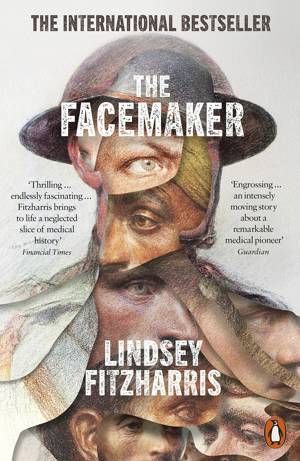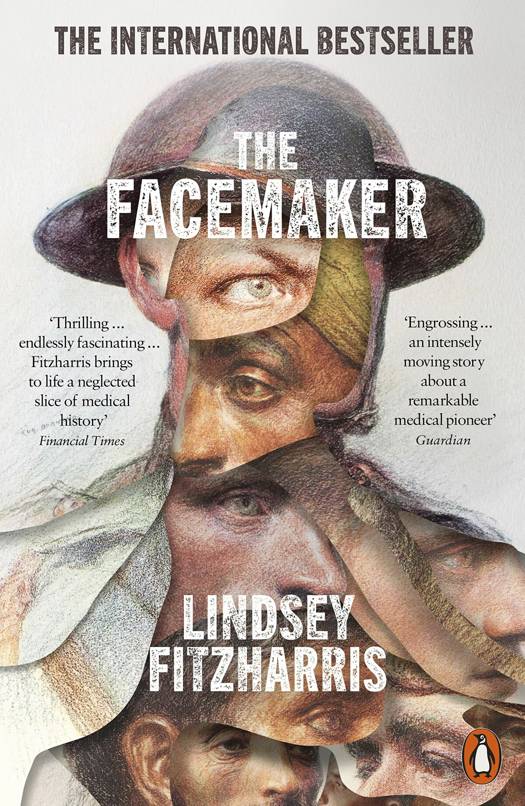
- Afhalen na 1 uur in een winkel met voorraad
- Gratis thuislevering in België vanaf € 30
- Ruim aanbod met 7 miljoen producten
- Afhalen na 1 uur in een winkel met voorraad
- Gratis thuislevering in België vanaf € 30
- Ruim aanbod met 7 miljoen producten
Zoeken
The Facemaker
One Surgeon's Battle to Mend the Disfigured Soldiers of World War I
Lindsey Fitzharris
Paperback | Engels
€ 15,45
+ 30 punten
Uitvoering
Omschrijving
From the moment the first machine gun rang out over the Western Front, one thing was clear: mankind's military technology had wildly surpassed its medical capabilities. The war's new weaponry, from tanks to shrapnel, enabled slaughter on an industrial scale, and given the nature of trench warfare, thousands of soldiers sustained facial injuries. Medical advances meant that more survived their wounds than ever before, yet disfigured soldiers did not receive the hero's welcome they deserved.
In The Facemaker, award-winning historian Lindsey Fitzharris tells the astonishing story of the pioneering plastic surgeon Harold Gillies, who dedicated himself to restoring the faces - and the identities - of a brutalized generation. Gillies, a Cambridge-educated New Zealander, became interested in the nascent field of plastic surgery after encountering the human wreckage on the front. Returning to Britain, he established one of the world's first hospitals dedicated entirely to facial reconstruction in Sidcup, south-east England. There, Gillies assembled a unique group of doctors, nurses and artists whose task was to recreate what had been torn apart. At a time when losing a limb made a soldier a hero, but losing a face made him a monster to a society largely intolerant of disfigurement, Gillies restored not just the faces of the wounded but also their spirits.
Meticulously researched and grippingly told, The Facemaker places Gillies's ingenious surgical innovations alongside the poignant stories of soldiers whose lives were wrecked and repaired. The result is a vivid account of how medicine and art can merge, and of what courage and imagination can accomplish in the presence of relentless horror.
In The Facemaker, award-winning historian Lindsey Fitzharris tells the astonishing story of the pioneering plastic surgeon Harold Gillies, who dedicated himself to restoring the faces - and the identities - of a brutalized generation. Gillies, a Cambridge-educated New Zealander, became interested in the nascent field of plastic surgery after encountering the human wreckage on the front. Returning to Britain, he established one of the world's first hospitals dedicated entirely to facial reconstruction in Sidcup, south-east England. There, Gillies assembled a unique group of doctors, nurses and artists whose task was to recreate what had been torn apart. At a time when losing a limb made a soldier a hero, but losing a face made him a monster to a society largely intolerant of disfigurement, Gillies restored not just the faces of the wounded but also their spirits.
Meticulously researched and grippingly told, The Facemaker places Gillies's ingenious surgical innovations alongside the poignant stories of soldiers whose lives were wrecked and repaired. The result is a vivid account of how medicine and art can merge, and of what courage and imagination can accomplish in the presence of relentless horror.
Specificaties
Betrokkenen
- Auteur(s):
- Uitgeverij:
Inhoud
- Aantal bladzijden:
- 320
- Taal:
- Engels
Eigenschappen
- Productcode (EAN):
- 9780141990293
- Verschijningsdatum:
- 5/06/2023
- Uitvoering:
- Paperback
- Afmetingen:
- 129 mm x 198 mm
- Gewicht:
- 274 g

Alleen bij Standaard Boekhandel
+ 30 punten op je klantenkaart van Standaard Boekhandel
Beoordelingen
We publiceren alleen reviews die voldoen aan de voorwaarden voor reviews. Bekijk onze voorwaarden voor reviews.











